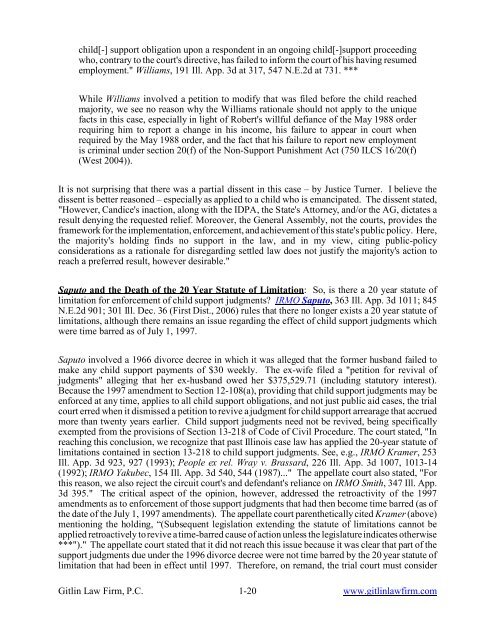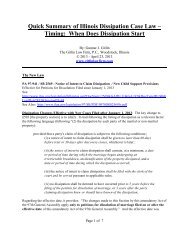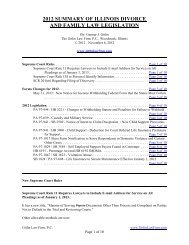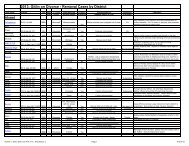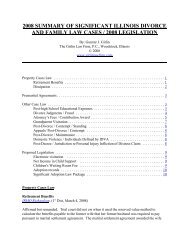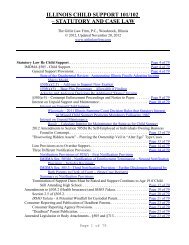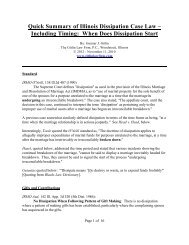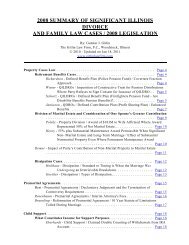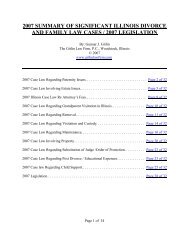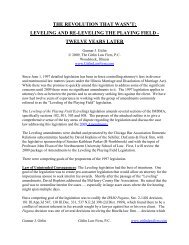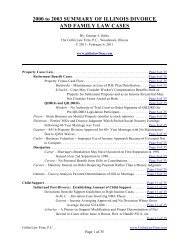child support 101/102 - The Gitlin Law Firm
child support 101/102 - The Gitlin Law Firm
child support 101/102 - The Gitlin Law Firm
Create successful ePaper yourself
Turn your PDF publications into a flip-book with our unique Google optimized e-Paper software.
<strong>child</strong>[-] <strong>support</strong> obligation upon a respondent in an ongoing <strong>child</strong>[-]<strong>support</strong> proceeding<br />
who, contrary to the court's directive, has failed to inform the court of his having resumed<br />
employment." Williams, 191 Ill. App. 3d at 317, 547 N.E.2d at 731. ***<br />
While Williams involved a petition to modify that was filed before the <strong>child</strong> reached<br />
majority, we see no reason why the Williams rationale should not apply to the unique<br />
facts in this case, especially in light of Robert's willful defiance of the May 1988 order<br />
requiring him to report a change in his income, his failure to appear in court when<br />
required by the May 1988 order, and the fact that his failure to report new employment<br />
is criminal under section 20(f) of the Non-Support Punishment Act (750 ILCS 16/20(f)<br />
(West 2004)).<br />
It is not surprising that there was a partial dissent in this case – by Justice Turner. I believe the<br />
dissent is better reasoned – especially as applied to a <strong>child</strong> who is emancipated. <strong>The</strong> dissent stated,<br />
"However, Candice's inaction, along with the IDPA, the State's Attorney, and/or the AG, dictates a<br />
result denying the requested relief. Moreover, the General Assembly, not the courts, provides the<br />
framework for the implementation, enforcement, and achievement of this state's public policy. Here,<br />
the majority's holding finds no <strong>support</strong> in the law, and in my view, citing public-policy<br />
considerations as a rationale for disregarding settled law does not justify the majority's action to<br />
reach a preferred result, however desirable."<br />
Saputo and the Death of the 20 Year Statute of Limitation: So, is there a 20 year statute of<br />
limitation for enforcement of <strong>child</strong> <strong>support</strong> judgments? IRMO Saputo, 363 Ill. App. 3d <strong>101</strong>1; 845<br />
N.E.2d 901; 301 Ill. Dec. 36 (First Dist., 2006) rules that there no longer exists a 20 year statute of<br />
limitations, although there remains an issue regarding the effect of <strong>child</strong> <strong>support</strong> judgments which<br />
were time barred as of July 1, 1997.<br />
Saputo involved a 1966 divorce decree in which it was alleged that the former husband failed to<br />
make any <strong>child</strong> <strong>support</strong> payments of $30 weekly. <strong>The</strong> ex-wife filed a "petition for revival of<br />
judgments" alleging that her ex-husband owed her $375,529.71 (including statutory interest).<br />
Because the 1997 amendment to Section 12-108(a), providing that <strong>child</strong> <strong>support</strong> judgments may be<br />
enforced at any time, applies to all <strong>child</strong> <strong>support</strong> obligations, and not just public aid cases, the trial<br />
court erred when it dismissed a petition to revive a judgment for <strong>child</strong> <strong>support</strong> arrearage that accrued<br />
more than twenty years earlier. Child <strong>support</strong> judgments need not be revived, being specifically<br />
exempted from the provisions of Section 13-218 of Code of Civil Procedure. <strong>The</strong> court stated, "In<br />
reaching this conclusion, we recognize that past Illinois case law has applied the 20-year statute of<br />
limitations contained in section 13-218 to <strong>child</strong> <strong>support</strong> judgments. See, e.g., IRMO Kramer, 253<br />
Ill. App. 3d 923, 927 (1993); People ex rel. Wray v. Brassard, 226 Ill. App. 3d 1007, <strong>101</strong>3-14<br />
(1992); IRMO Yakubec, 154 Ill. App. 3d 540, 544 (1987)..." <strong>The</strong> appellate court also stated, "For<br />
this reason, we also reject the circuit court's and defendant's reliance on IRMO Smith, 347 Ill. App.<br />
3d 395." <strong>The</strong> critical aspect of the opinion, however, addressed the retroactivity of the 1997<br />
amendments as to enforcement of those <strong>support</strong> judgments that had then become time barred (as of<br />
the date of the July 1, 1997 amendments). <strong>The</strong> appellate court parenthetically cited Kramer (above)<br />
mentioning the holding, “(Subsequent legislation extending the statute of limitations cannot be<br />
applied retroactively to revive a time-barred cause of action unless the legislature indicates otherwise<br />
***")." <strong>The</strong> appellate court stated that it did not reach this issue because it was clear that part of the<br />
<strong>support</strong> judgments due under the 1996 divorce decree were not time barred by the 20 year statute of<br />
limitation that had been in effect until 1997. <strong>The</strong>refore, on remand, the trial court must consider<br />
<strong>Gitlin</strong> <strong>Law</strong> <strong>Firm</strong>, P.C. 1-20 www.gitlinlawfirm.com


